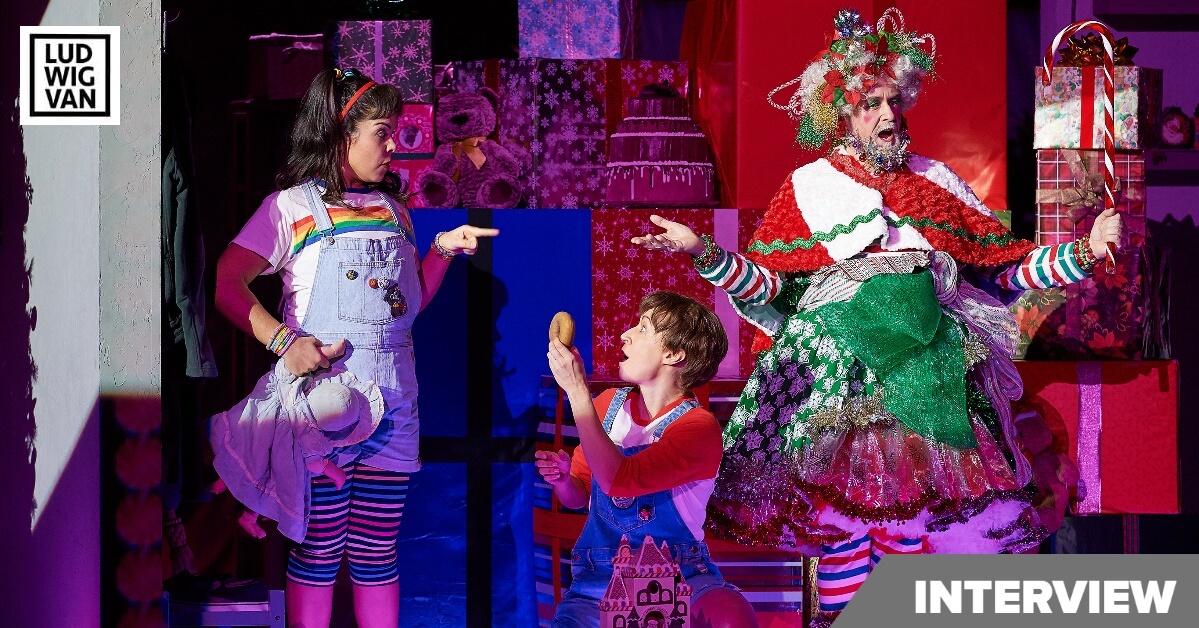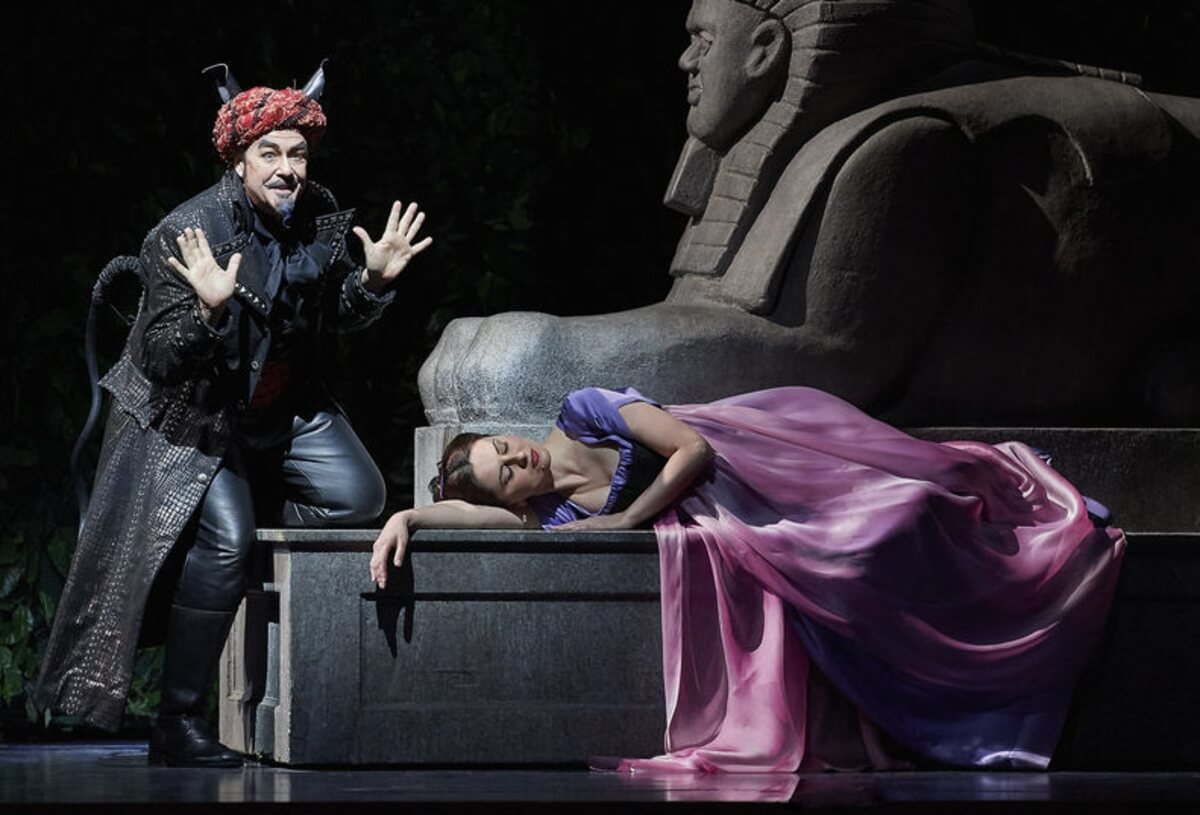The veteran Canadian tenor reflects on his operatic journey that spans the romantic leads of Mozart and Bel Canto to character roles of Reimann and Humperdinck.

As they say — time flies when you are having fun. Tenor Michael Colvin knows it all too well. The Canadian has already been singing professionally for over 22 years. In the second half of his career so far, Colvin has transitioned from the typical romantic leads of Mozart and Bel Canto to that of character tenor roles. Whether jolly or evil, audiences can count on Colvin bringing to each character the requisite theatricality and brilliant vocalism.
It’s with this new repertoire that Colvin has achieved an international breakthrough at the highest level — a check of his schedule includes opera houses the likes of Covent Garden, Paris, and Salzburg, with La Scala and Madrid on the horizon. While Tamino, Belmonte, Lindoro, and Ottavio are no longer in the cards, he’s having a whale of a time with Herod (Salome), Monostatos (Die Zauberflöte), Bob Boles (Peter Grimes), Duke of Cornwall (Lear), and now his first Witch, the Hexe in Hansel and Gretel at the Canadian Opera.
Lest you think that character singing implies a certain diminution of vocal prowess, it’s simply not true with Colvin. Everything is sung, not barked, and as beautifully as the music would allow, with a fresh and youthful timbre that has always been his. In 1998 and fresh out of university, Colvin joined the COC Ensemble and made his professional debut as Flavio in Norma. Barely a year later, the late COC General Director Richard Bradshaw chose him to sing Count Almaviva in The Barber of Seville. “Talk about baptism by fire!” recalls Colvin.
That big break meant the start of a solid career on both sides of the Atlantic. Although these days he spends the better part of the season singing in the UK and Europe, Toronto continues to be his home, which he shares with his wife, soprano Mary Bella, and their two sons, Andrew (17) and Ben (14).
The COC remains a spiritual home of sorts, given it’s the opera company where he got his start. Last heard as Thomas Scott in Louis Riel two seasons ago, Colvin is now trying on the Witch for size.
Given my last interview with Michael Colvin was 21 years ago, for an article in Opera Canada, a follow up is long overdue. Now a fully mature artist, Colvin has a wealth of experience many singers of his generation would envy. A 22-year international career qualifies him as a bona fide veteran. When I mentioned that to him in our recent chat, the morning after my having sat in on a rehearsal, he was slightly bemused by the idea. “It doesn’t feel like it was so long ago when I was a young, up and coming singer!”

Time flies, that’s for sure! I remember hearing you sing when you were still in opera school in the ‘90s, and then in the COC Ensemble Studio. Tell us about those early days…
The first thing I ever did was as Flavio in Norma at the COC in 1998. In January 1999, I was slated to sing the Officer in The Barber of Seville, and I ended up getting thrown on as Almaviva, with Russell (Braun) and Isabel (Bayrakdarian). That was my first mainstage lead role. I also did a TV commercial for the Nissan Pathfinder, singing the last few bars of “Recondita armonia.” I got kidded a lot about that! (laughs)
Oh I remember that TV commercial! Did you ever sing Cavaradossi (Tosca)?
Nope — I don’t have a Puccini voice.
Since the COC Barber gave you a head start, has your operatic journey developed the way you expected?
That’s an interesting question. If you had told me some 20 years ago that I would one day be singing on the stages of La Scala, Paris Opera, Royal Opera Covent Garden, I wouldn’t have believed it. In that regard my career has far exceeded my expectations. Did I think I’d be singing now, at age 50? Probably I would not. It’s all a matter of perspective. Young artists all want to be the next star, but that wasn’t the path I took. As good an actor as I am, I’m never going to be six-foot tall, blond and gorgeous — that’s the reality of it…it’s never going to change. When I look back over the years at my successes… Remember the Le Roi Ouf I did in Charbrier’s L’etoile in opera school? That was one show where people came up to me and told me I was very funny. From early on, I gravitated towards those funny roles, though character roles aren’t always funny. You also have to be scary and menacing.
I was watching you last night in rehearsal as the Witch, and I kept thinking — someone is going to ask him to sing Mime!
I’d love to, absolutely! It’s like singing Herod in Salome or Monostatos in Magic Flute — I love it!
You’ve sung a huge variety of roles, from principal roles in Mozart and Bel Canto to character roles in Britten, and now Enescu and Reimann. What are the pros and cons of taking on these so-called character roles?
I find that there’s a tendency to dismiss character singers as, dare I say, not real singers. In the days of yore, some character tenors would bark their way through the music. A lot of companies often give character parts to young artists, that actually does a disservice to them. You need to have lived life, know how to act, to move onstage, and you have to know how and when to sound good, when to sound ugly — that is to sing ugly in a healthy way. On the other hand, if done correctly, a character singer can have a very long career, since the roles are not as vocally taxing.

Absolutely! In my travels to German houses where Fest artists are basically civil servants, they often start out as principals and end up as character singers, some sing until they drop! And you do sing the roles. I was listening to your “Ride” last evening. You sang the B flat at the end, over a heavy orchestra. There was no cheating.
This role of the Witch — it goes up to a high B and down to a low B flat, all the while I’m running around, riding my vacuum cleaner (laughs)!
I’m curious about your other two new roles — Laïos in Enescu’s Oedipe, and the Duke of Cornwall in Reimann’s Lear. What are they like? Is the music difficult?
Enescu is not particularly difficult. The Reimann piece is hard to describe. It was composed in the 1970s, and it’s tonal, with gorgeous writing for Lear himself and his daughter Cordelia, and for the Fool. I sing the role of Duke of Cornwall, with the famous scene of the blinding of Gloucester. My music is horrible — it sounds like aural assault. You listen to this music and you’re shaken to the bones by it.
Oh wow…How artistically fulfilling is it to do something like this?
It’s challenging for sure. I’ll be very honest — if I just did this contemporary stuff all the time, I think I would find that exhausting. I need to mix it up with recitals and concert work. I’m still doing Messiah! And I’m doing Monostatos at the Royal Opera next season in the David McVicar production. I don’t want to short change the music in Reimann as some people really like it! And it’s incredibly satisfying dramatically and theatrically. These days audiences are more open in a way that they weren’t in the past. To get younger people into opera, we need to explore the darker tonal roles.

Would you say it’s the most challenging of all roles you’ve sung?
Not vocally, but certainly dramatically. It’s an exhausting evening. Musically it’s so over-the-top. My role is only 10 minutes of singing, but it’s fff over a really large and loud orchestra.
Hmmm, not great for the voice!
But if you know how to sing, it’s not a problem. A lot of this contemporary stuff challenges you, to make sure you have a technique that can withstand this sort of thing. In a way, these character roles, if sung well, there are moments when the beauty comes through. The Witch in Hansel and Gretel for example, when you are singing “Komm, klein Mäuslein…” it’s like singing a Lied.
You know, I’ve interviewed many, many singers over 25 years. Some of them, the principal artists, said to me that they would not sing character roles, because they want to stay “at the top,” so to speak…
We’re all conditioned from an early age to always wanting to be the heroes, the prima donnas, the divos. The reality is that opera is a team sport and you need the muckers and — if I use hockey as an analogy — you need the guys to go to the corners and get the puck so that the superstars can score. I see myself in that vein. As a member of the team. I take my job very seriously. These supporting roles are essential to a good show. A supporting, character role, gets to shine, like the Witch in Hansel and Gretel. I love the ensemble nature of opera. In my experience, the most successful productions are often the ones where people check their egos at the door and everyone works together to create a wonderful piece. Those are the most memorable moments in my career.
One final question — now that you are the elder statesman (!), what advice would you give to aspiring young singers?
Surround yourself with people whose opinion you trust and value. Maintain relationships outside the opera world. It’s very important to have balance in your life. And not getting too wrapped up in what you do. Remember you are not your voice. As performers there are times when we go through difficult periods vocally. You’ve got to have things outside the opera world to sustain you during these difficult times…that’s very important. Finally, always maintain a sense of awe and wonder — it really is a remarkable thing, what we do! Singing, throwing our voices into these enormous halls — never lose that wonder and appreciation.
Toi toi toi for opening night!
Update: After the dress rehearsal, I contacted Colvin to get his thoughts on the show. He was elated at how things went. “The final dress went very well indeed, and the audience seemed to really enjoy it. Lots of laughs in the right places and enthusiastic cheers at the end. Such a pleasure working with this wonderful team! It really is a complete team effort. I feel so blessed to do this for a living!”
#LUDWIGVAN
Want more updates on classical music and opera news and reviews? Follow us on Facebook, Instagram or Twitter for all the latest.
- SCRUTINY | Opera Atelier’s All Is Love Makes Triumphal Return - April 15, 2024
- SCRUTINY | From The Heart: Ema Nikolovska And Charles Richard-Hamelin Offer Unique Program At Koerner Hall - March 26, 2024
- SCRUTINY | The Glenn Gould School Spring Opera Presents A Superb Dialogues Des Carmélites - March 22, 2024



